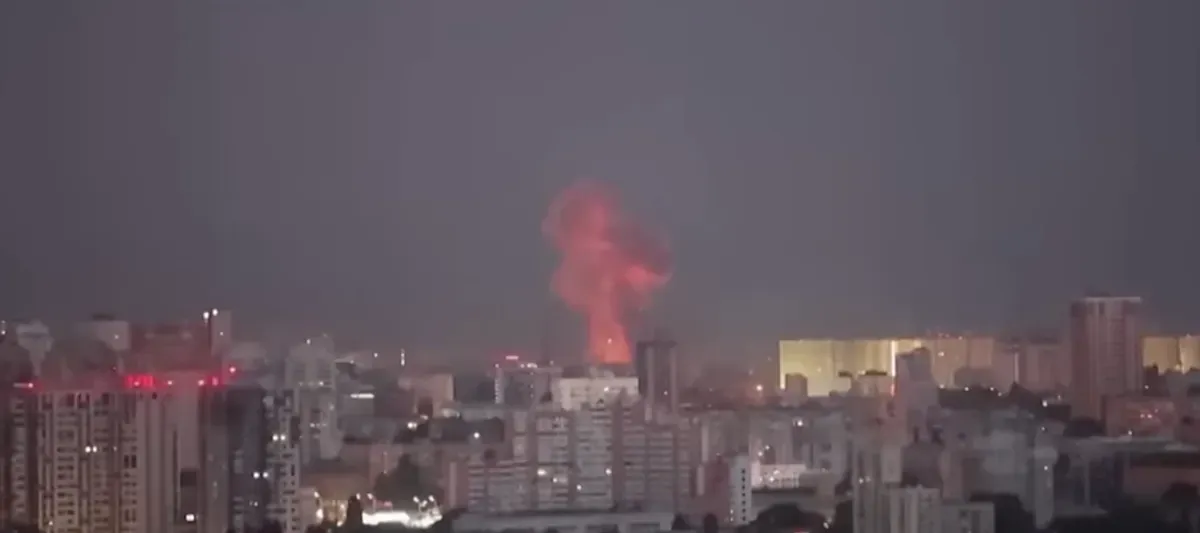Kyiv Endures Renewed Russian Airstrikes Amid Intensifying Conflict
Kyiv faces renewed Russian missile strikes, escalating tensions and civilian hardships as Ukraine calls for stronger international support.

Kyiv, the heart of Ukraine, endured another wave of intense Russian missile strikes early Monday morning, as the conflict between Russia and Ukraine entered a new phase of heightened tension. The attacks, which began around 5:00 a.m. local time, targeted critical infrastructure and residential areas, rattling the capital with a series of explosions and anti-aircraft fire that lasted for nearly half an hour. This latest assault marks a continuation of the fierce fighting that has left both nations on edge.
As dawn broke over Kyiv, residents found themselves once again taking cover in basements and bomb shelters. For many, the familiar sounds of air raid sirens and anti-aircraft guns have become part of daily life. Mayor Vitali Klitschko confirmed that falling debris from intercepted missiles caused damage to residential buildings, a water plant in the Holosiivskyi district, and several schools that had just reopened for the new school year.
The Ukrainian Air Force reported successfully intercepting the majority of the incoming threats, including over 10 cruise missiles and nearly 10 ballistic missiles. Yet, even with these defenses in place, debris from destroyed missiles caused injuries and sparked fires, revealing the difficulty of protecting a densely populated city against sustained aerial bombardment.
This latest assault is seen as part of a broader shift in Russian tactics, focusing on relentless strikes aimed at Ukrainian cities to pressure the government and test the limits of Ukraine’s air defenses. Analysts suggest that Russia's use of a mix of conventional and less accurate missiles, reportedly including North Korean ballistic weapons, is intended to overwhelm defensive systems and maintain psychological pressure on the Ukrainian population.
The intensified Russian attacks follow a weekend of Ukrainian drone strikes targeting facilities in Russia, including an oil refinery near Moscow. While the strikes on Russian soil were a significant escalation, they also demonstrated Ukraine's willingness to retaliate and project power beyond its borders.
President Volodymyr Zelensky responded to the renewed attacks by reiterating calls for more advanced defensive and offensive weapons from Western allies. “We need the means to stop these attacks at their source,” Zelensky said. “Only by having the tools to defend our cities and hit back can we bring this war to an end.”
Foreign Minister Dmytro Kuleba also called for lifting restrictions on Ukraine's use of Western-supplied long-range missiles, arguing that these limitations have hindered Ukraine's ability to deter future Russian aggression effectively. “It’s time for our partners to trust us and provide what is necessary to defend our people,” Kuleba stated.
However, there are differing views among Ukraine’s Western supporters. While some NATO members advocate for increasing military support, others remain cautious, wary of actions that could provoke a broader conflict with Russia.
The conflict’s latest escalation has raised alarms in neighboring countries. Poland, a staunch NATO ally, responded swiftly by deploying fighter jets to patrol its airspace near the Ukrainian border. Polish Foreign Minister Radoslaw Sikorski stressed that Poland is ready to defend its territory against any spillover from the conflict, underscoring the potential for regional instability.
Finland has taken a different approach, proposing new laws to ban property purchases by Russian nationals, citing national security concerns. "We must protect our borders not just with military readiness but also by securing our economic and social systems from potential hostile influence," said Finnish Defense Minister Antti Hakkanen.
In Kyiv and other Ukrainian cities, the human cost of the conflict continues to mount. Hospitals report a steady stream of patients injured by debris and shattered glass, while emergency crews work around the clock to extinguish fires and clear the rubble from destroyed buildings. Schools, once considered safe spaces, have become targets, and parents are left grappling with the fear of sending their children out into a city under siege.
On the Russian side, state-controlled media continue to downplay the impact of Ukrainian strikes on Russian territory, focusing instead on justifying Russia's military actions as necessary responses to what it terms Ukrainian "provocations." Russian President Vladimir Putin, speaking during a visit to the Tuva region, reiterated that recent Ukrainian actions would not derail Russia’s objectives in eastern Ukraine.
At the same time, reports from regions like Belgorod, which borders Ukraine, suggest a different reality. Social media accounts and independent sources describe significant destruction and anxiety among local residents, with many questioning the official narrative.





